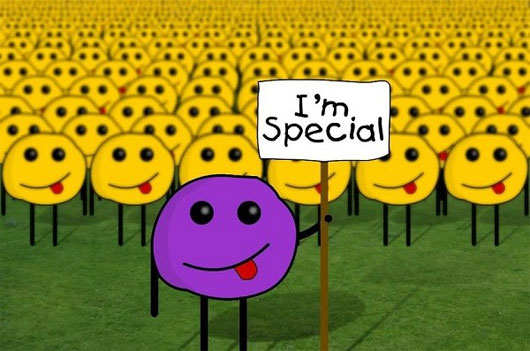Science explains why you think you are better than people
Scientists have found the reason why many people always consider themselves better than others in some aspect of life .
Everybody on Earth has a certain ability, which makes each individual character unique. Some people are physically strong, but the ability to recognize things is not really good. Others carry on themselves a high concentration, hard work, but less enthusiastic.
However, most of us don't think so. We think that, in all areas, I may not be the best but definitely better than many. This syndrome is called 'superior illusion' by the science - the illusion of superiority , or it can be called funny 'power illusion'. Let's explore this phenomenon through information from Io9 page below.
1. Mindful of the talent itself
American scientists have conducted a small test, in which they ask motorists to assess their abilities and compare with their peers. As a result, 93% of the respondents confidently answered 'my skills are very good, better than my colleagues and of course above average'.

However, this 'above average, very good' result is not really accurate because it does not rely on any standard but simply compare itself with others.
A survey with 20 computer software company employees also produced similar results, one-third of respondents said their qualifications were above all and only one person lost.

The results of these surveys indicate that people do not think they are 'top' , but tend to assume that they are 'top' . And with being 'top on' in all areas will make us illusive or become different and talented.
2. People have (or delusions have) a pure heart
Before reading this section, try answering the question: What is the closest 'really good' book you read? And why do you read it?
Most people will answer 'I like reading' , or 'Because I like this author' , or 'I want to learn more' . However, also this problem, researchers ask volunteers predicting the reason for a stranger to read books, the results are often things that are not appreciated as 'according to tastes', 'about to have movies based on this work' .

This syndrome is called the 'exogenous bias bias' - the extrinsic incentives bias . This is the syndrome that people attribute to the 'motivation' of others because of the external impact, instead of the internal motivation.
A study has proven, people often think what they do comes from themselves. For example, when reading a book, it is because of the 'desire to learn' , or to work passionately from passion.

Maybe these reasons are true, but besides, people also lower the goals and motivation of those around them. They think that other people work for high salaries, read books according to tastes . or if they do well, it is also due to external circumstances. With such thoughts, it is obvious that everyone thinks of them as a 'special person' and is more talented than a person.
3. Human instincts
Scientists ask whether we accept changes when we realize that we are always illusory, our illusions are the best, convince ourselves to do better than others?

After the study, the scientists confirmed that this change seems impossible because people are more or less confident in themselves. We can hardly change when we think we are only in the lower group, always in the low. Along with that, the phenomenon of 'illusion of asymmetric understanding' - the illusion of asymmetric insight exists in each of us.

This phenomenon suggests that we can recognize the illusion of skills and values of people around us but we always deny ourselves. People tend not to admit to being insensitive, lazy, mean or at least "not the most mean and lazy," but many other people are lazy. And even, there are people who just assume they are right, and others are wrong.
- Science explains the most intelligent age of people
- Why do blind people usually have good hearing?
- Radon: The invisible danger
- Science explains the difference between humans and animals
- Science explains the true character of a secret person?
- Strangely, black people have blond hair
- Explaining the attraction of thousands of long films
- Decode the cause of a sudden death in Siberia
- Science explains why the mother-in-law and the bride-in-law
- Happiness or not is due to genes
- The new hypothesis explains why male and female lemurs are about the same size
- Science explains the fact that parents are more favored than their children
 'Fine laughs' - Scary and painful torture in ancient times
'Fine laughs' - Scary and painful torture in ancient times The sequence of numbers 142857 of the Egyptian pyramids is known as the strangest number in the world - Why?
The sequence of numbers 142857 of the Egyptian pyramids is known as the strangest number in the world - Why? History of the iron
History of the iron What is alum?
What is alum?